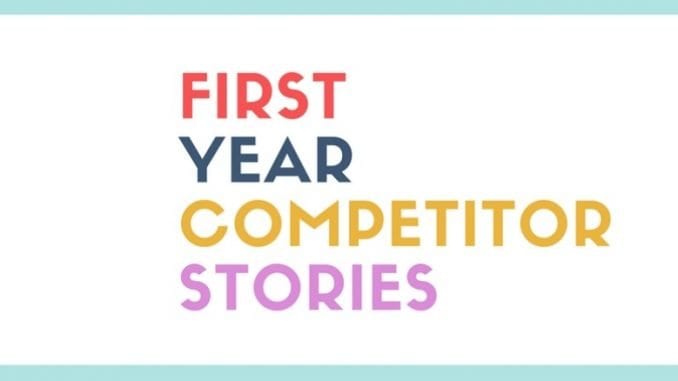
Spilled drinks, misunderstood rules, and countless hours of practice—this is what first year coffee competitors go through. We’ll revisit their experiences for stories that will inspire, motivate, and perhaps make you cringe.
In this new series, we’ll share stories from competitors’ first year of competition at the United States Coffee Championships. Some stories will be from newly minted competitors, and others will share the success and horror stories from veteran competitors in seasons past. If you’re interested in contributing a story about your first year of competition, drop us a line!
VOLUME 1: BY KAY CHEON
One competitor reflects on his journey through the current barista competition season.
For me, my path in competition began a few years ago with a friendly “throwdown”-style competition called “Anything Goes,” hosted by Bar Nine in Culver City, Calif. My parents were both able to make it out there and, for the first time, watch me present and brew coffee. Formally, however, I had never competed until before the U.S. Coffee Champs preliminaries, held at Klatch Coffee in Rancho Cucamonga, Calif. Alongside my coworker and fellow competitor Felix, I typed up the script for my routine in the back seat of the car; on the morning of the competition, we cupped the coffees we were given to compete with, blending them spoonful by spoonful on the table.
Moving on from the preliminaries, it was time to plan for the Qualifying Event in Reno, Nev., which was a little more involved. I had not read the rules carefully enough, so until about a month before Reno, I had thought I was required to present milk beverages along with the espressos and signature beverages. In his usual calm way, the owner of the shop where I work, Todd, coached me as to what I would need to compete, from wares to ideal flavor profiles. Having access to a basement full of wares from previous competitors from our company was also a nice way to find inspiration. The entire team at Dune Coffee and The French Press pulled together to allow me scheduled work time to practice in the lab, as well as volunteering as judges for practice routines and tasting my coffees.
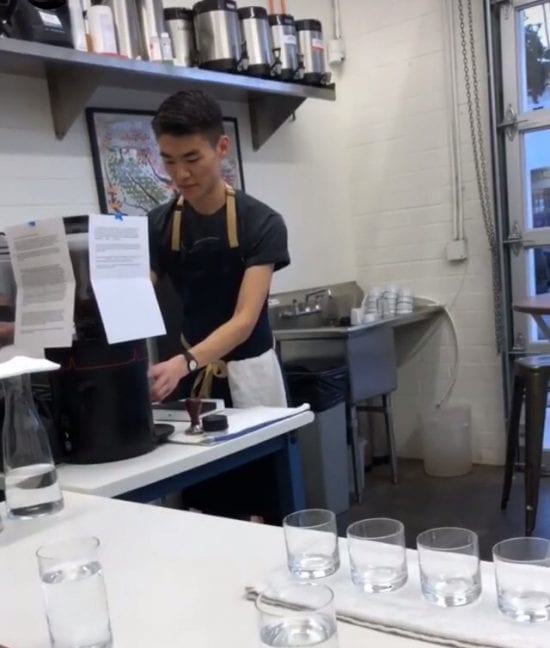
I started going into the lab later and later into the night, having already rearranged it into a mock competition space. At first, I taped my speech to the hopper of my grinder before I had it memorized, so I could practice my lines by turning the hopper lid to face wherever I was working at the moment. Meanwhile, Todd was working on roasting the coffee as best he could. I had also finally landed on a signature drink (after hours of consulting Karen Page and Andrew Dornenburg’s The Flavor Bible and wandering the farmers market) that tasted pretty good.
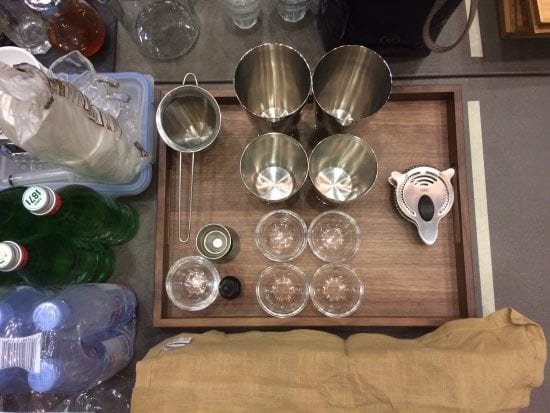
Nature decided to abruptly flip the script, which ended up affecting not just my plans for competition, but my entire community. One morning I got up early to walk over to our lab when I saw a fine dusting of ash on the ground, and the usual blue morning sky was a slight tinge of pink. This was the beginning of the Thomas Fire, which remains California’s largest wildfire to date. Initially, myself and many others figured the fire would never reach us, having started more than 40 miles away. As it bore down on Ventura, just 30 miles south of us, the fire’s effects were felt more and more in our town, especially when several of our staff were forced to evacuate their homes. It became difficult to focus on something that seemed so trivial as barista competition when people’s homes were at risk, and when news images of the fire and the smell of smoke filled our consciousness. There was one particular instance I remember when I heard my phone, as well as the phones of guests in the café, sound off a chirp alerting everyone of a voluntary evacuation notice for Santa Barbara.
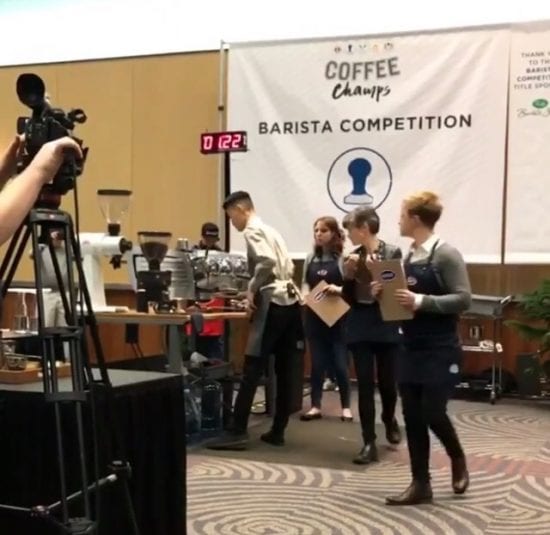
However, I knew I needed to focus and push through. Whereas I had paced nervously around before the preliminary competition at Klatch, balancing on a curb outside and repeating my script over and over, I felt more at ease in Reno. I had also decided to eat vegan instead of my usual vegetarian diet at this point for competition, thinking it might help with any anxiety-induced upset stomachs and make me feel sharper and more focused. I made sure my hands would be moisturized so I wouldn’t be serving the judges with cracked, dry hands. I spent the night going through my routine, saying my script out loud while also verbalizing what I would be doing at each particular movement and mimicking each movement I would make.
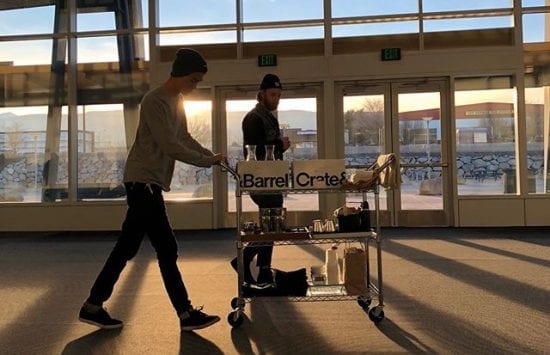
From the setup time to the start my routine, I don’t remember exactly what was going through my head. I do know I was terrified of starting my time and immediately fumbling my words, so I tried to slow my heart rate down as much as possible before jumping off the deep end. Later, my mom—who had tuned into the livestream to watch me compete—mentioned that I took a noticeably long time before calling time and starting. Once I got my first few lines off, though, I felt so much more comfortable, and my movements felt much more natural compared to the hurriedness of setting up. As I brought my signature drink tray to the judge’s table, I made it my primary focus to make eye contact and try to convey what I had put forth through smiling and emphatic description. This also helped me with my nerves—it was like instead of shrinking away, I was standing up straight. I was having fun, and as I served my espressos, I was smiling. In fact, it was only until I looked over my shoulder at the clock after calling time that I stopped smiling.
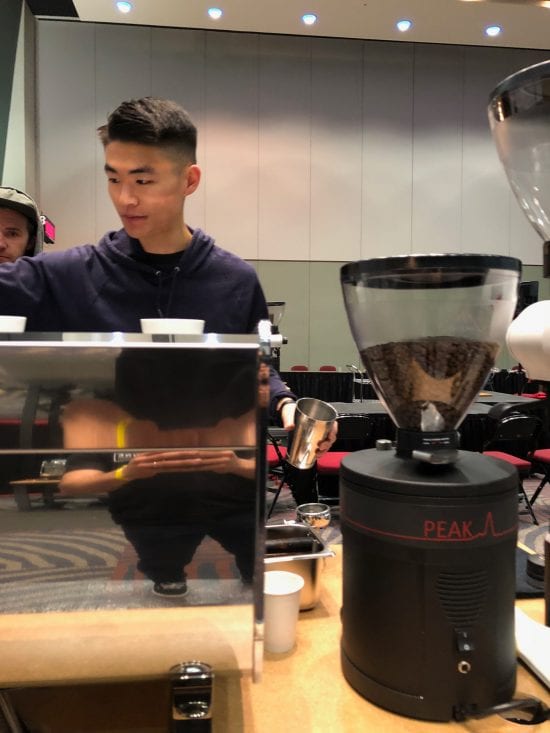
On Sunday, the announcements of the results of each competition were underway, but the four of us were also preoccupied with the looming fires back home. Felix and Collin were communicating with employees and making sure the cafés would be staffed in light of the evacuations, while Matt and I were worried about our partners and making sure they were safe. Even while I was waiting for the barista competition results, I was also thinking about what I would pack should I be forced to evacuate, what would fit in my car, and what was irreplaceable.
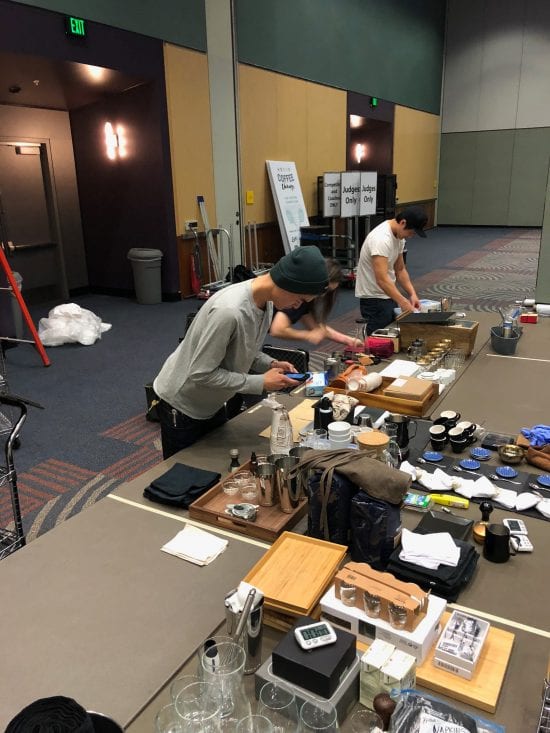
Having sat in third place for the first day of competition, my heart sank a little when I didn’t hear my name called for third place. But after checking the final results on paper, I was thrilled to see that I had placed fourth, and would not only be moving on to nationals in Seattle, but I would also receive a bye to start in the semifinals round there. I also chided myself slightly for being disappointed earlier, as I had told myself before arriving that I would be happy simply to advance to Seattle. At the same time, I felt confident in the time I had put in, the time I would be putting in to prepare for the national level, and the abilities of my team, the coffees, and myself.
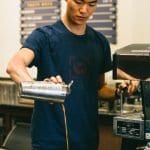 ABOUT THE AUTHOR
ABOUT THE AUTHOR
Kay Cheon works as a coffee educator and bartender in Santa Barbara, Calif., where he is privileged enough to share what little knowledge he has with the people around him and taste good things and work on bettering service alongside them. His current favorite drinks are tasty batch-brewed coffee and shaken bittersweet cocktails.

